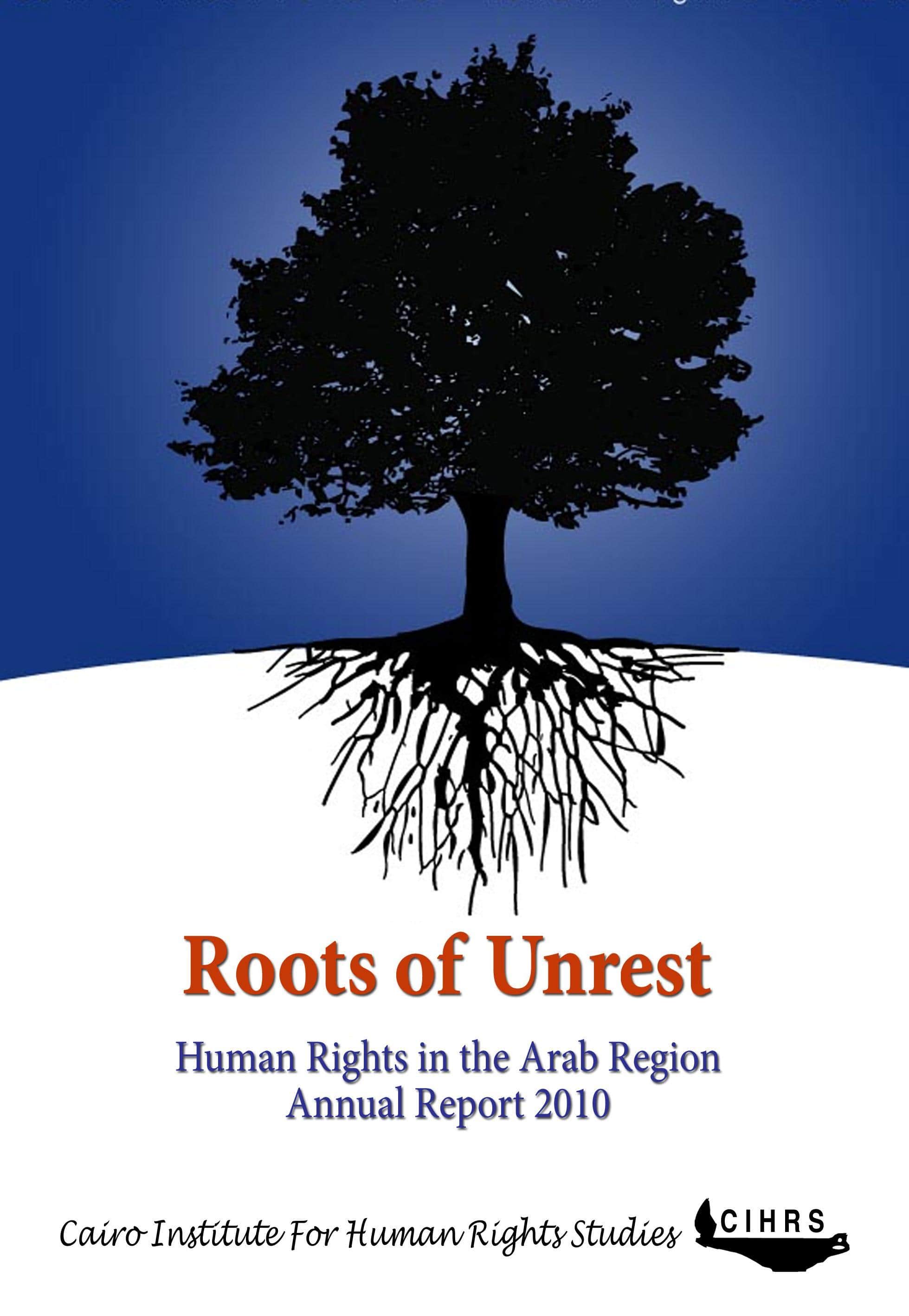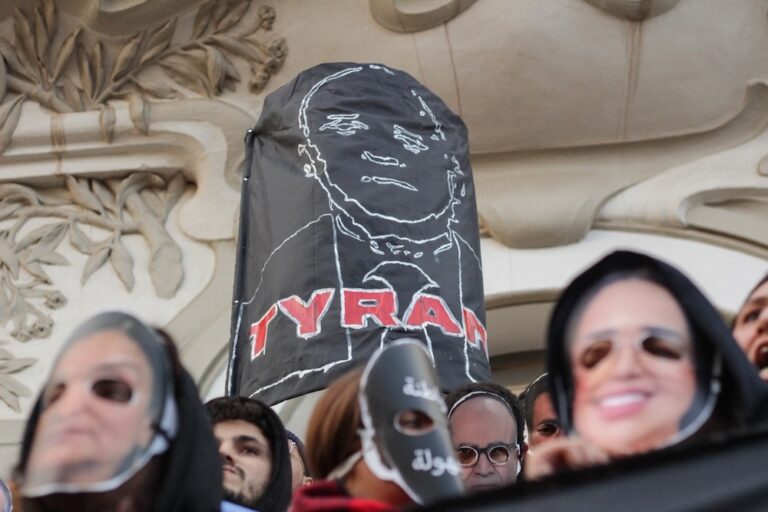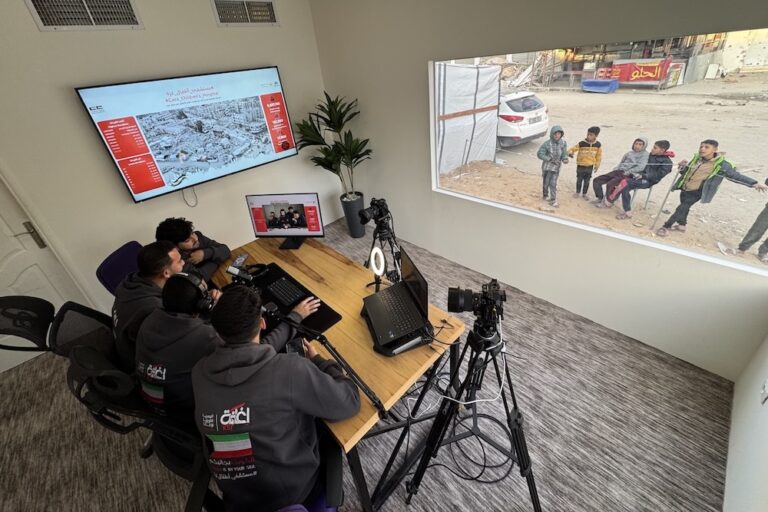Blocking outlets for peaceful expression, by placing pressure on freedom of expression and the media, was identified as one of the roots of unrest in the region.
(CIHRS/IFEX) – March 29, 2011 – Today, the Cairo Institute for Human Rights Studies (CIHRS) issues its third annual report on the state of human rights in the Arab world in 2010, with a special focus on 12 countries: Egypt, Tunisia, Algeria, Morocco, Sudan, Syria, Lebanon, the Occupied Palestinian Territories, Iraq, Kingdom of Saudi Arabia, Bahrain, and Yemen.
The report is entitled “Roots of Unrest”, speaking to the distinctive popular revolutions sweeping across the Arab world, which have thus far toppled two of the most entrenched police dictatorships in the region, in Egypt and Tunisia, and is striking at the seats of other dictatorships in Libya and Yemen. The uprising is also compellingly imposing the need for serious, far-reaching reforms in several states, particularly Morocco, Bahrain, and Algeria, and is having repercussions in Syria, where people are living under a tyrannical regime that barely permits its citizens to breathe.
A thorough review of the report reveals that the primary roots of unrest in the Arab world are:
• A large-scale deterioration in the state of human rights, even in those countries that were, or still are, characterized by a level of ostensible political “stability”.
• A lack of political will among the Arab regimes to advance the status of human rights in their countries.
• Stagnant legislatures: Arab regimes have preserved an endless supply of legislation hostile to human rights, that is used to discipline and harass their opponents and prosecute reformists, human rights defenders, and advocates. This report notes some developments on the legislative front in 2010, mostly introduced to further restrict and suppress liberties, particularly in Egypt, Tunisia, and Sudan.
• The perpetuation of an authoritarian approach to entrench impunity and immunity for gross human rights violations.
• The use of states of emergency and counterterrorism laws to justify serious crimes, including extrajudicial killings, abductions and involuntary disappearances, arbitrary arrests, torture, and unfair trials, particularly in Tunisia, Egypt, Yemen, Syria, Bahrain, Morocco, and Saudi Arabia.
• The continuation of policies that cement and perpetuate absolute rule or hereditary succession, such as in Egypt, Tunisia, and Yemen; or secure systematic ethnic or sectarian social and economic discrimination and political exclusion, such as in Bahrain, Saudi Arabia, and Syria.
• The falsification of citizens’ will through rigged general elections. This report documents the contemptible practices of the Mubarak regime in administering the so-called parliamentary “elections” for the People’s Assembly and the Shura Council that were to precede the presidential elections of 2011. In the run-up to elections, the regime launched an unprecedented campaign of suppression that included incitement to kill demonstrators, the abduction of political activists, and a crackdown on media and new technologies for information dissemination. The situation differed little in Bahrain, where parliamentary elections were preceded by the widespread detention of hundreds of people, among them prominent political opposition figures and human rights defenders. Many of the detainees were brutally tortured before being referred to trial under the counterterrorism law.
General elections in Sudan were also conducted in a repressive climate that continued even after the vote. Election outcomes in Sudan were rigged by manipulating the census and gerrymandering electoral districts. There was open voter fraud, and the population of South and West Darfur were unable to vote, while violence and chaos prevented elections from taking place at all in several districts.
• Blocking outlets for peaceful expression by placing pressure on freedom of expression and the media, both traditional and new, especially in Yemen, Egypt, Sudan, and Bahrain. Morocco continued its policy of stifling the press, especially on issues relating to the King, the royal family, Islam, or the Western Sahara conflict.
• As for the regime of the now deposed Ben Ali in Tunisia, it continued its absolute confiscation of media freedoms and deployed the capacities of the police state to harass journalists and prosecute them on false charges. Various human rights defenders and political activists, as well as trade unionists, were placed under close surveillance and endured various forms of harassment and physical assault. Indeed, the media, totally dominated by the state, launched smear campaigns against many of these activists.
In Syria, the regime maintained its hostility and intolerance for freedom of expression and towards political activists and human rights defenders in general. The regime’s hostility was also particularly apparent when it came to the rights of the Kurdish minority. Yet, the regime of Ali Abdullah Saleh in Yemen surpassed even the Syrian regime over the course of last year, sending dozens of journalists to trial, where most of them received harsh prison terms and had their professional credentials revoked. Newspaper offices were stormed by state security, and several journalists were targets for physical attacks or assassination attempts. Both journalists and human rights defenders faced abductions, temporary disappearances, and torture, while some were then referred to exceptional courts lacking all due-process guarantees.
( . . . )



